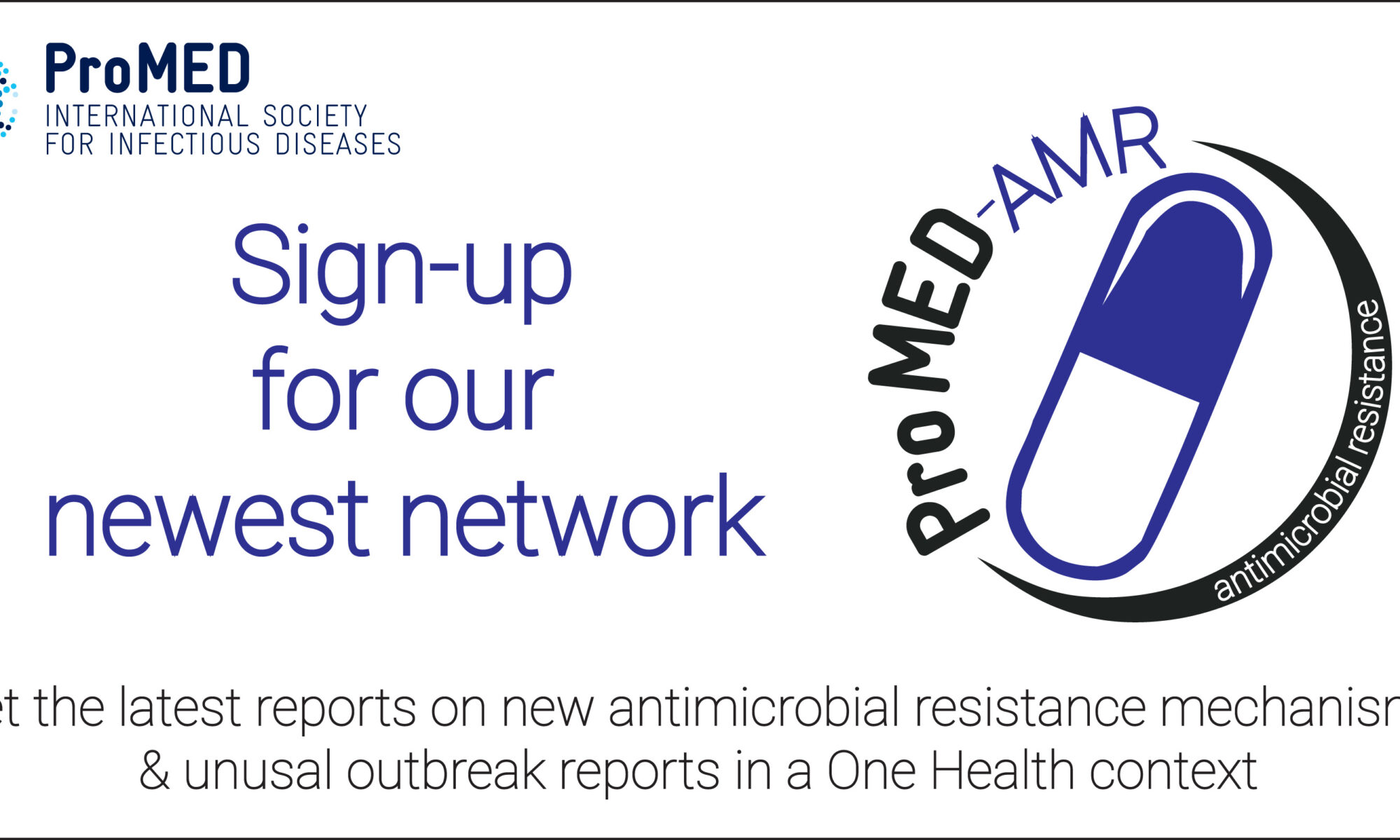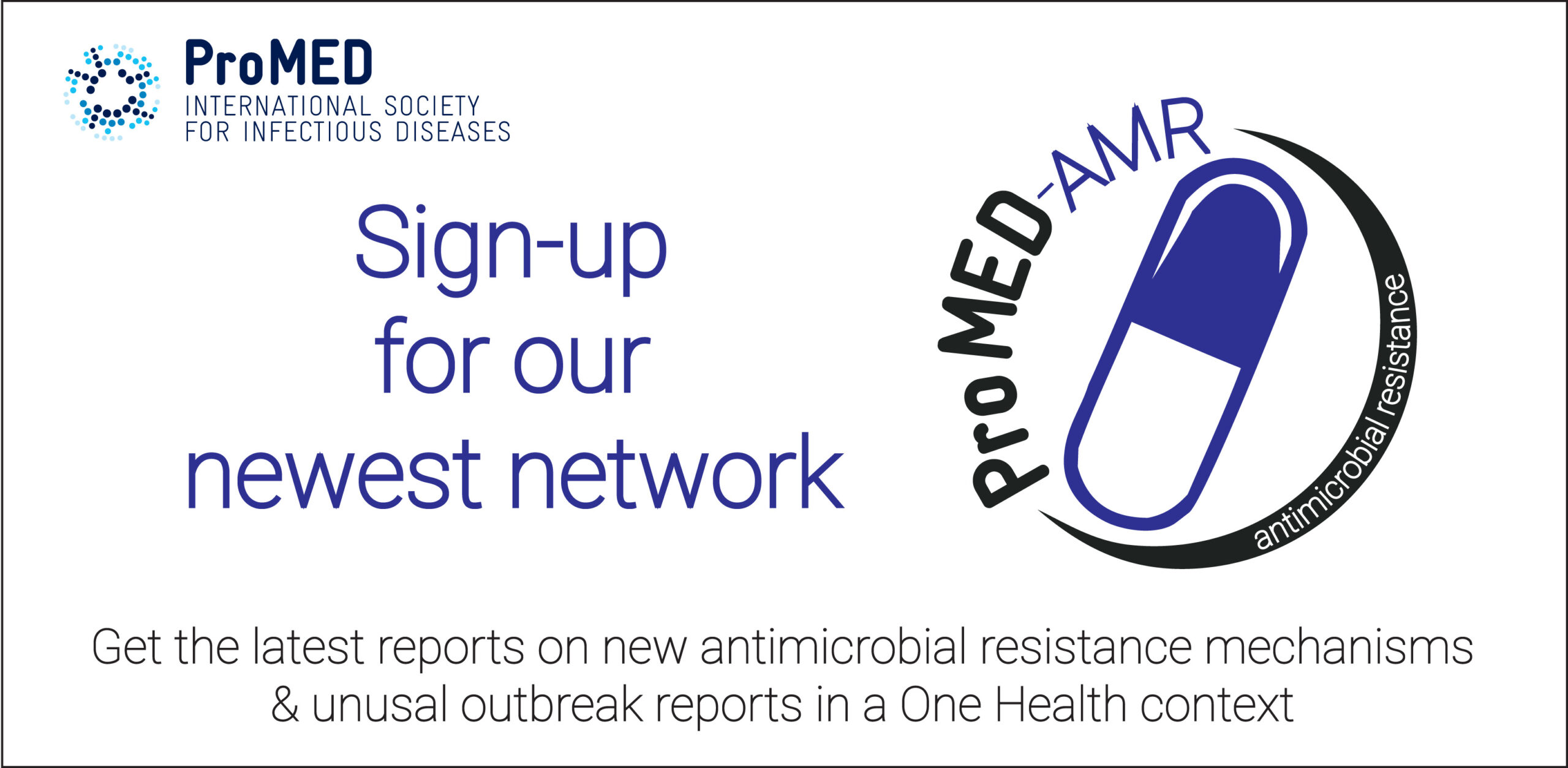During the COVID-19 pandemic, it has been difficult to focus on the myriad of other emerging disease threats that we at ProMED bring to your attention each day. Another pandemic, smoldering for decades and perhaps worsened by the onslaught of COVID-19, are the illnesses caused by antimicrobial resistant (AMR) pathogens. Antimicrobial resistance — the ability of bacteria, viruses, fungi, and parasites to thrive even in the presence of medications that would normally destroy them or inhibit their growth — is a global challenge. The inappropriate use of antimicrobials, including their overuse in agriculture, animals, and humans, low-quality or fraudulent medicines, poor infection prevention and control, and inadequate disease surveillance, diminishes our arsenal of tools that treat and prevent infectious disease. AMR puts at great risk the advances made in preventing and treating infectious diseases during the past century.
The International Society for Infectious Diseases and ProMED are pleased to announce a new global surveillance network focusing on antimicrobial resistance. ProMED-AMR will collect new information using digital disease detection methods and non-traditional sources, which will be vetted, analyzed, and commented upon by a global team of AMR subject matter specialists. Reports on trends, new cases, or clusters of AMR will be disseminated in near real-time to an international audience, in an effort to enhance global AMR surveillance. The primary goal of ProMED-AMR is to build global public health capacity to rapidly detect and validate the occurrence of antimicrobial resistant pathogens in animals, humans, and the environment to help prevent further AMR expansion. ProMED-AMR will engage the international infectious diseases community in a forum for the exchange of ideas, information, and commentary relating to AMR and increase the knowledge base of effective and safe medicines to prevent and treat infectious diseases.
The principle of One Health guides all of ProMED’s work and because the issue of AMR cuts across human, animal, and environmental health, it is the quintessential One Health issue. AMR is also a “One World” issue. Increasing movements of people and livestock, the globalization of the food system, and ever-expanding international trade foster the spread of microbes, including drug-resistant ones.
This effort is led by ProMED Associate Editor Dr Matt Levison, an infectious diseases specialist with longstanding expertise in AMR. He is Adjunct Professor of Medicine and former chief of Infectious Diseases at Drexel University, Philadelphia. He was a CDC Epidemic Intelligence Officer and a fellow in infectious diseases at Cornell-New York Hospital and serves on the editorial board of the Merck Manual for infectious diseases. Co-moderating will be ProMED-MENA moderator Dr Ghassan Matar, Professor and Chairperson in the Department of Experimental Pathology, Immunology & Microbiology and Director WHO Collaborating Center for Reference and Research on Bacterial Pathogens at the American University of Beirut. The global ProMED-AMR team includes experts from each of the other WHO regions: Dr Tin Tin Myang (Myanmar), Dr Tamer Osman (Egypt), Dr Emmanuel Benyeogor (Nigeria), and Dr Sophie Bowman-Derrick (Australia).
You, as a member of the ProMED community, are a vital component of ProMED-AMR. The role of the astute observer in supporting ProMED-AMR’s surveillance effort is an important complement to our active mining of AMR data from many sources.
We are grateful to funding support from Public Health England, which has allowed us to make ProMED-AMR a reality.
While the ProMED global list has and will continue to include the most critical reports relating to AMR, ProMED-AMR will be able to focus much more bandwidth on this issue. If AMR is of interest to you, please sign up for a free subscription to ProMED-AMR at https://isidcongress.org/promedmail-subscribe/. Posts are also available on our main website by clicking on the ProMED-AMR tab.
Please join me in welcoming ProMED-AMR to the ProMED family and thank you for your interest and support.
—
Larry Madoff, MD
Editor, ProMED
<[email protected]>





